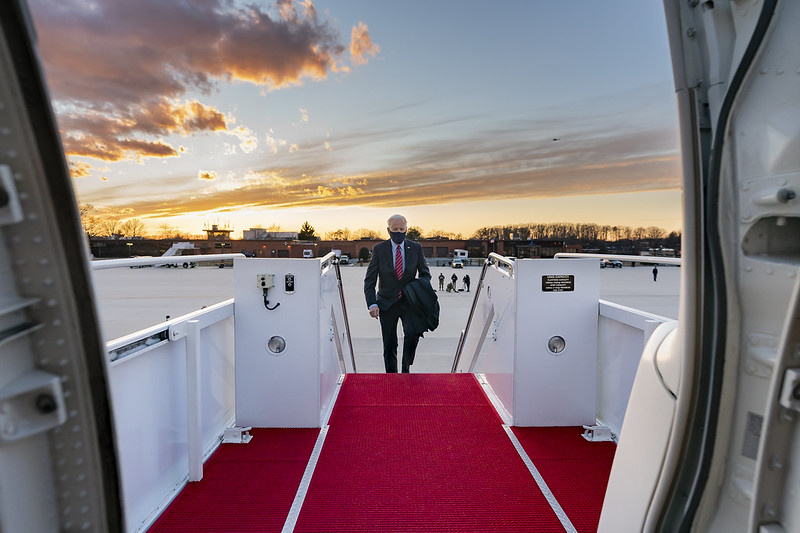Has Biden caused a wind of change to blow in the Middle East?
Posted By Amin Saikal on February 19, 2021 @ 12:00

A wind of political change seems to be suddenly blowing across the troubled Middle East. Egyptian authorities have unexpectedly freed an Al Jazeera journalist from jail and Saudi Arabia has conditionally released a human rights activist. Both have happened in the wake of Joe Biden’s inauguration as US president. Are these moves likely to be followed by more and wider changes affecting the regional geopolitical landscape?
The releases of Mahmoud Hussein, who had been incarcerated in Egypt since 2016, and Loujain al-Hathloul, who had languished in a Saudi prison since 2018, came as a surprise to many in the region and beyond.
Hussein was accused of seeking to overthrow the Egyptian government and having an allegiance to the banned Muslim Brotherhood, although no formal charges were ever laid against him. An Egyptian national, but working for the Qatari Al Jazeera news network, Hussein and his employer had denied any wrongdoing, asserting that he was simply fulfilling his normal duties as a journalist.
Hathloul, on the other hand, had been convicted in a closed trial on a number of ‘criminal’ charges and sentenced in December to five years and eight months in prison, despite widespread international protests on her behalf. However, her release is conditional, limiting her movement and leaving her vulnerable to being arrested again.
Whatever the details of either case, Hussein’s and Hathloul’s releases may mark the dawn of an era in which not just Egypt and Saudi Arabia but also other regional states, including Israel, might find it expedient to change tack to align themselves with the new occupant of the White House.
Biden has already announced a number of policy initiatives that signal a Middle East policy approach very different from that of his predecessor, the neonationalist populist Donald Trump. He has emphasised human rights as a major foreign policy issue, halted the sale of offensive weapons to Saudi Arabia and the United Arab Emirates, withdrawn America’s support for the Saudi-led Arab operation in Yemen and called for an end to the Yemen war which has inflicted massive devastation on the country’s population. This week, he removed [1] the Iran-backed Houthis, who have been fighting the Arab coalition and its Yemeni allies, from the US list of terrorist organisations and announced [2] that he will deal only with the ageing Saudi King Salman bin Abdulaziz rather than his controversial young son and Saudi Arabia’s de facto ruler, Mohammed bin Salman.
Biden has also said that he favours a US return to the 2015 Iran nuclear agreement, provided Tehran restores all of its commitment to the deal. He has also intimated that his administration doesn’t recognise Israeli settlements in the Palestinian territories as legitimate and has restored some of America’s funding to the Palestinians for humanitarian and security purposes.
Considered together, these announcements indicate that the Biden administration isn’t interested in dealing with the region through a lens of ‘business as usual’. Its policy shift carries the potential to exert pressure on regional actors to engage in reform and conflict resolution, and thus dismantle some of the hurdles that have rendered the Middle East so turbulent and branded America as a contradictory player in the region.
Of course, the Middle East is not an arena where states can easily be compelled to succumb to America’s policy preferences. They have in the past often succeeded in using their individual geopolitical, geoeconomic and geosecurity viabilities and vulnerabilities to cut through or get around pressure coming from different US administrations. In recent times, we have seen Arab, Iranian and Israeli authorities find ways to defy or survive America’s cajoling—whether through diplomatic or interventionist means.
However, Biden’s initiatives come at a time when all governments in the region are struggling, though in varying degrees and intensity, to cope with Covid-19 and its far-reaching economic and social consequences, as well as growing public demand for better governance and living conditions.
Even Israel—America’s closest Middle East ally—is not free of this dictum. It has experienced an unprecedented level of political instability, economic hardship and public protests, not to mention its lingering internationally damaged image over its continued occupation of Palestinian land and treatment of its inhabitants.
Comparably, as America’s adversary, Iran has faced deeper and wider challenges. It has suffered enormously from American sanctions and the coronavirus’s savagery, which have given rise to intense bursts of public discontent from time to time.
The releases of Hussein and Hathloul could not possibly have materialised free of Biden’s policy initiatives. They may mark the start of more responses from the region, which also follows the end of the Saudi-led blockade of fellow Arab state Qatar. Yet, any further favourable development will depend on whether Biden will be able to maintain firmly the momentum of his liberalist approach and press on with it to make a real difference in the Middle East.
Although Biden is confronted with mounting domestic and other foreign policy challenges, he has made a well-intentioned start with the Middle East at a time when the regional environment appears to be quite conducive to his policy changes.
Article printed from The Strategist: https://www.aspistrategist.org.au
URL to article: https://www.aspistrategist.org.au/has-biden-caused-a-wind-of-change-to-blow-in-the-middle-east/
URLs in this post:
[1] removed: https://www.aljazeera.com/news/2021/2/16/biden-admin-ends-trump-era-houthi-terrorist-designation
[2] announced: https://www.reuters.com/article/us-mideast-usa-biden-idUSKBN2AG2AR
Click here to print.